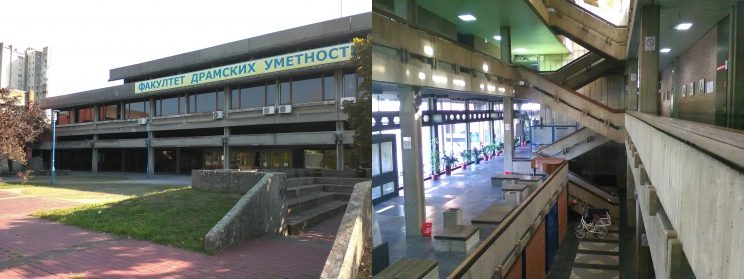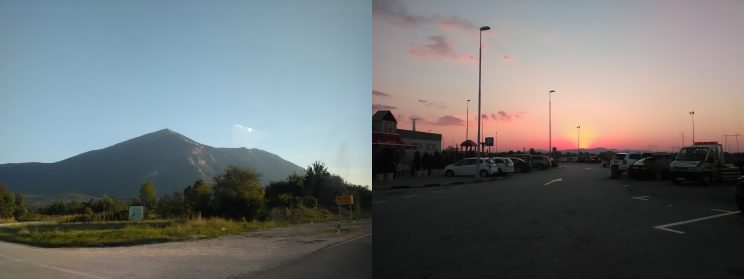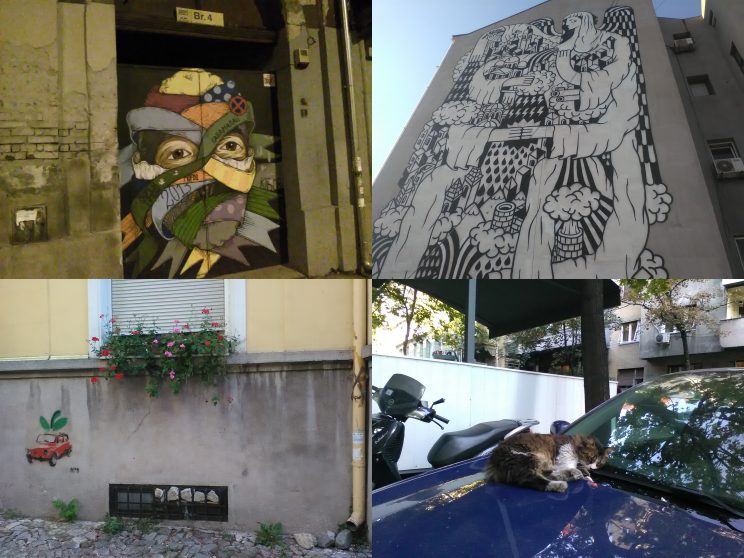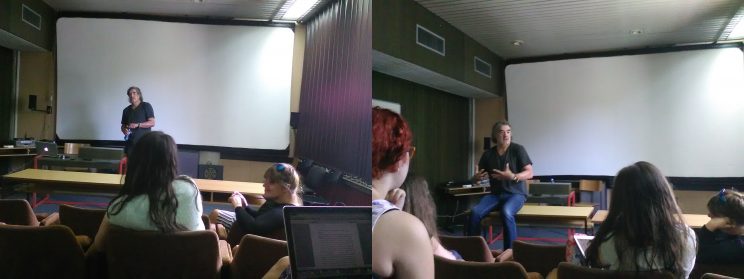It was all quite unexpected, like an extra mid-credits scene in a superhero movie. Belgrade was a surprising extra stop in The 5C Cine Caravan across the Balkans, an event organized by Nevena Dakovic and Aleksandra Milovanovic, two professors from the Faculty of Dramatic Arts.
We had all met Aleksandra Milovanovic at Divan Film Festival (in Cetate, Romania), where she gave a very interesting theoretical masterclass on editing. From Divan, we all boarded a minivan, and set off towards Bulgaria… and you are right, Belgrade is the capital of Serbia. But this is the Balkans: cinema is great, roads not so great. The most convenient way was to make a small detour through Bulgaria.
Our expertise on cinema was challenged almost as soon as we set foot on Serbian soil: a smoking truck – packed with washing machines and refrigerators, we found out later – was blocking the road. All the stupid Hollywood action films were going through my mind: is this a safe distance? Pretty soon the cabin was engulfed in flames. I remembered reading somewhere that cars very rarely explode from a crash, the film crew use explosives to make it look spectacular. Nobody got hurt but we had to find another route through the countryside, and spend some more hours on the road. We could only get a distant view of Rtanj, the mountain “disguised” alien pyramid, that supposedly Arthur C. Clarke declared “the navel of the world”; but we did catch a gorgeous sunset from a gas station on the outskirts of Belgrade.
It was dark already when we arrived but I could tell that Belgrade would become one of my favorite cities: it has history, the Danube and the same vibrant mural art scene I saw in Athens in our first stop.
So much for the “caravan”, now for the “cine” part. Since it was not a scheduled stop in the initial project, I was expecting a more relaxed program, compared to the usual 5C business. I was wrong, but not disappointed. In just two days we received an intensive crash course into contemporary Serbian cinema and film criticism (not to mention the whole immersion in the local culture and history of this capital).
I would start not with the film people that we met, but with the film buildings. The events were hosted by the Faculty of Dramatic Arts (University of Belgrade) and the Yugoslav Film Archive. I immediately fell in love with the chunky, brick and concrete, brutalist style, communist architecture of the film school. It “reminded” me of this time when arts education was not so unimportant or underfinanced. But mostly I just daydreamed about how it would have been to spend four years of my life studying for a BA in film there

By contrast, The Yugoslav Film Archive, is almost something of the future: both in its design, but also because it seems an unlikely investment for any Balkan country. As we found out later, the archive is second only to the French one in number of films preserved, and this legacy is owed chiefly to Josip Broz Tito personal obsession with cinema. At the archive we had the chance of a private screening of Humidity and Q&A session with young and promising director Nikola Ljuca. We also had a chance to tour the Archive museum, and to appreciate their choice of cinema greats to honor.
But the meeting that struck me the most, was that with maverick Serbian director Milutin Petrovic. That is how professor Nevena Dakovic introduced him, and he was quick to challenge the word: “maverick if you want, but I prefer freak”. He then went on to challenge his very presence in the same school where he studied and also taught for a period (he now has his own small private school): “you cant think about movies through freaks… but through classical directors”. Was it modesty or just coyness, I do not know, but the performance that followed was charming so it really didn’t matter.
Warm, witty, well-read, and with a bit of rock star aura about him, Petrovic is well known for his The land of Truth, Love and Freedom, that earned him some festival acclaim. I have not managed to see any of his films, but his style has been described as very personal and idiosyncratic (and elitist by some of his critics). He went on to stress the importance of understanding film language for a film critic: “When you talk about film language you need to talk in film language, not from journalism or literature… If you could write what it means it’s not a good movie.” Professor Dakovic made an interesting remark at this point, quoting Bazin: “Review tells you what you see. The critique tells you how to see. ”
On the importance of film critics, Petrovic remembered an anecdote involving the premiere of Goddard’s Breathless: there was a definitive silence at the end of the projection, apparently the crowd was baffled; and in that awkward silence Jean Cocteau stood up, started clapping and declared it revolutionary masterpiece. The internet doesn’t have any recollection of this event, and Jean Cocteau is first of all Jean Cocteau, but a young critic can dream, can’t he? This is why I will end with a very courageous statement from the same Milutin Petrovic. I do not believe it to be true, and it would be impossible to prove, but there is some approximation of truth that comes from the poetic beauty of the wording itself:
“We, the filmmakers, we are working class. Critics are the elite, the lead guitars. They put the epitaph on the tombstone of our civilization.”




